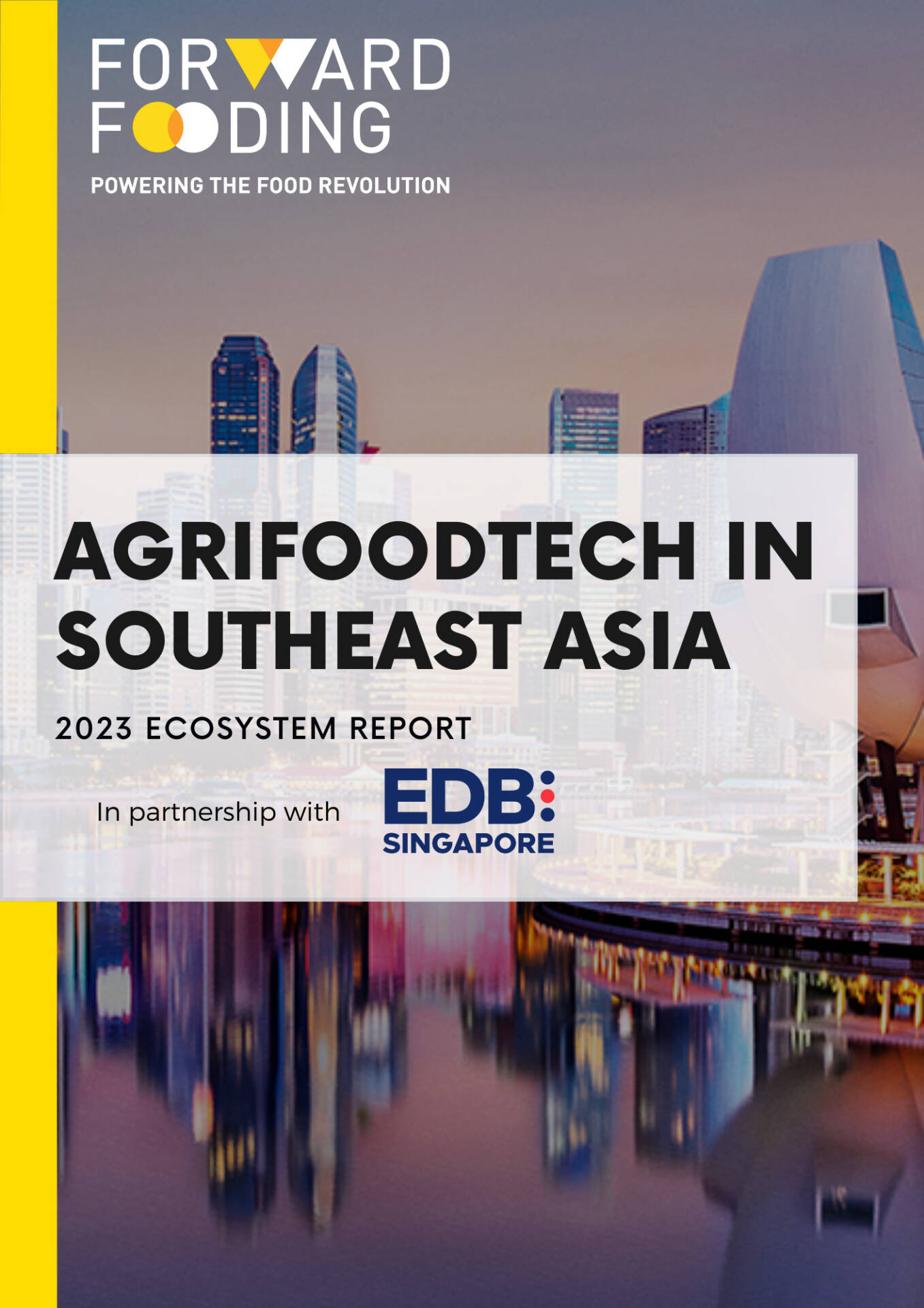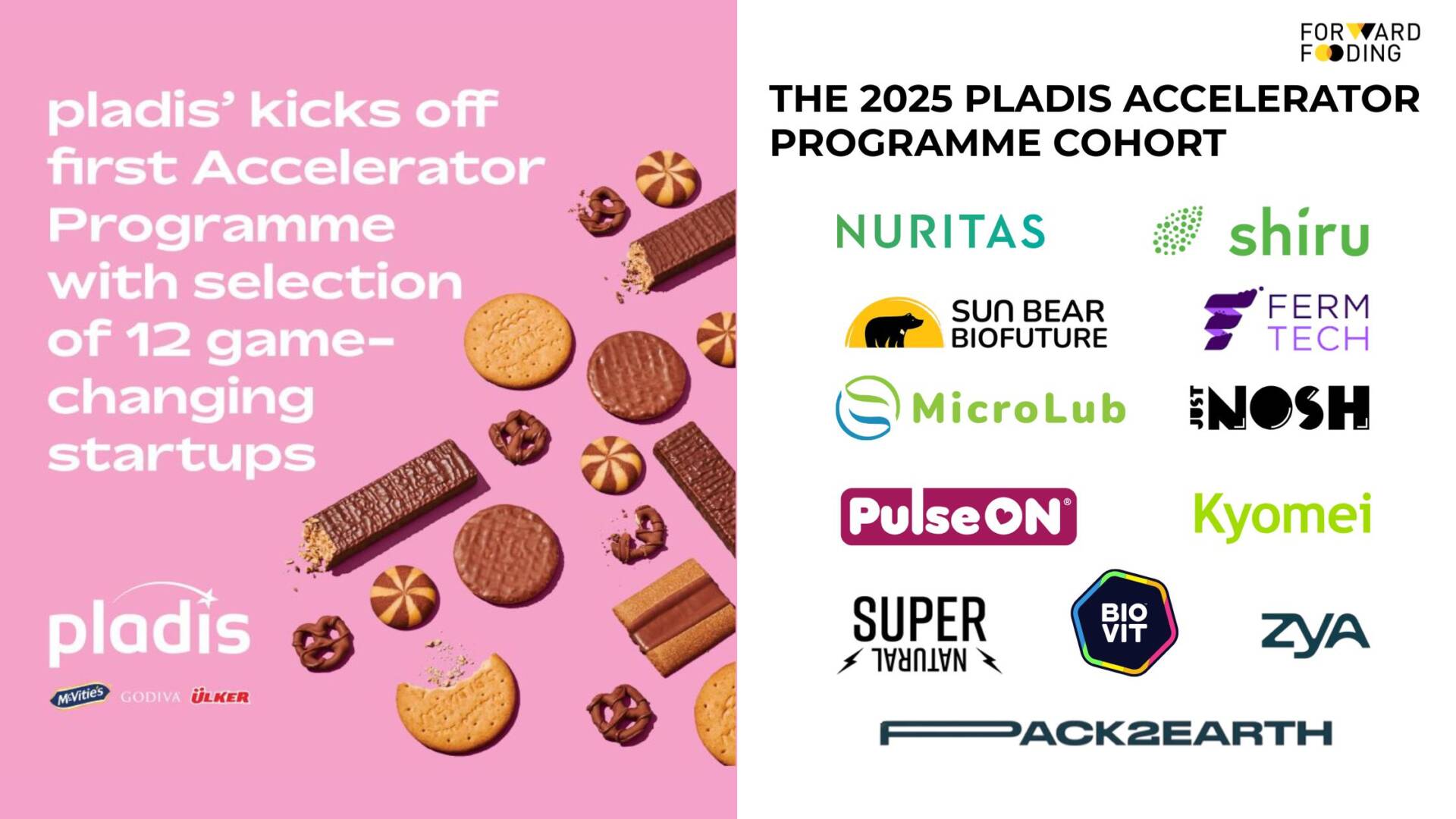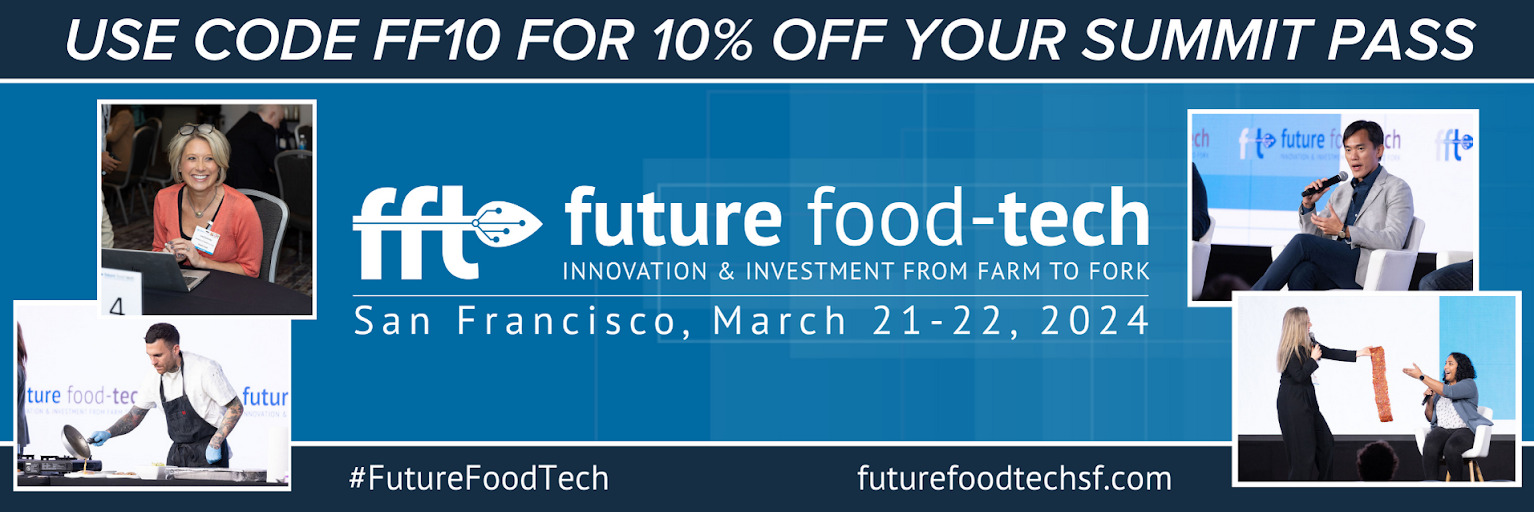FORWARD FOODING
THE BLOG
How AI and Machine Learning are Transforming the AgriFoodTech Landscape
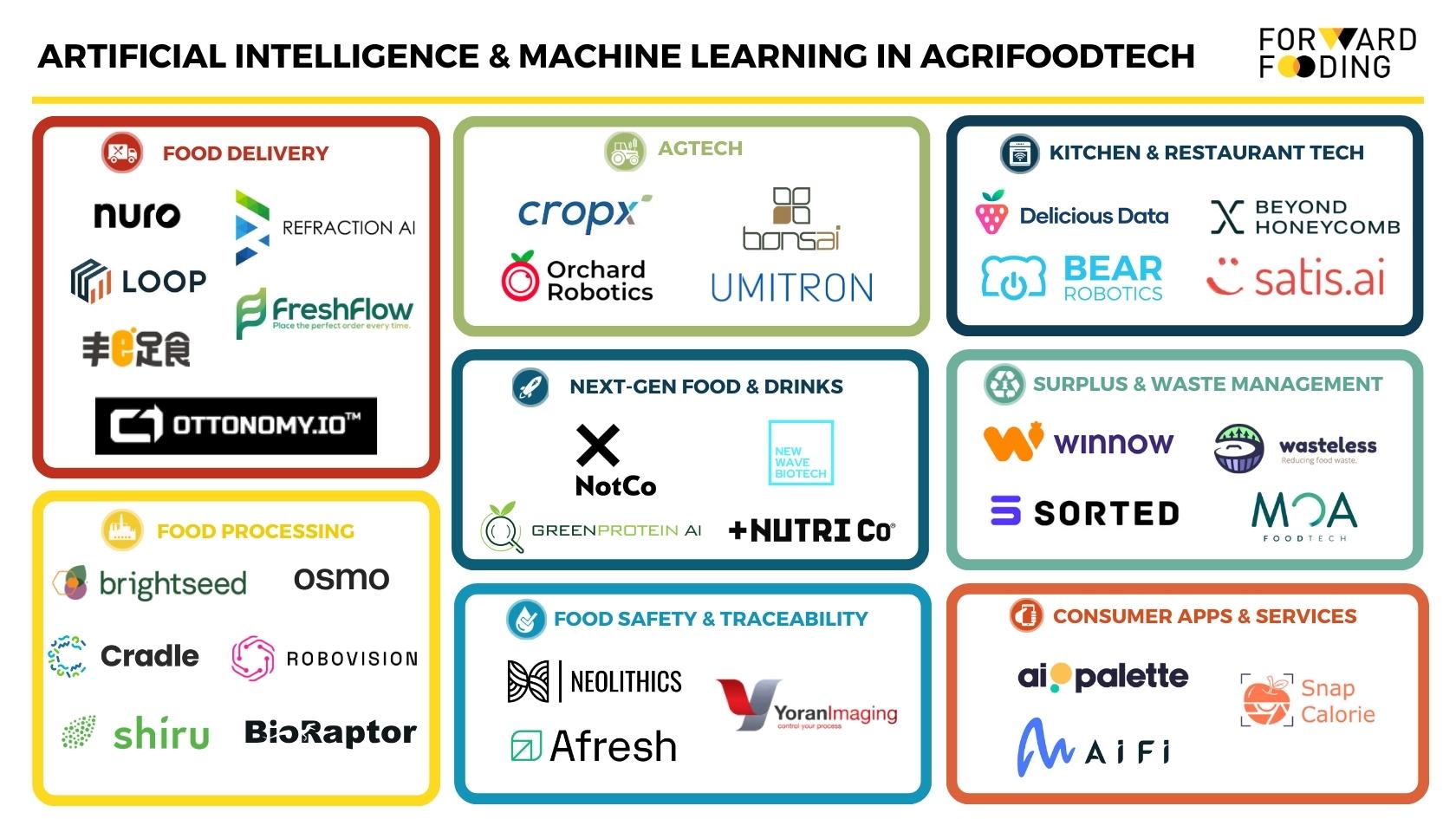
In recent years, the AgriFoodtech industry has undergone a significant transformation, driven by the integration of Artificial Intelligence (AI) and machine learning (ML) technologies. These advancements are reshaping every aspect of food production, distribution, and consumption, offering unprecedented efficiency, safety, and personalization. This article delves into how AI and ML are revolutionizing FoodTech, showcasing practical applications, benefits, and the latest trends and innovations.
AI and Machine Learning in the AgriFoodTech Value Chain
In food production, AI and ML drive precision agriculture and smart farming. Farmers use data to optimize crop yields, manage resources efficiently, and reduce environmental impact. According to McKinsey, the 2 key areas that can unlock economic value in the agriculture sector are 1) on-farm economics improvements (e.g. labor and input costs and yields) and 2) increased sales, productivity, and operational efficiencies. Recently, Syngenta Seeds announced its collaboration with InstaDeep to accelerate the development of solution-providing crop traits for farmers.
Food safety and quality control have also greatly benefited from AI. ML algorithms detect contaminants, reducing the risk of foodborne illnesses, while AI-driven quality control maintains high standards throughout production. Additionally, personalized nutrition and consumer insights are enhanced by AI through tailored dietary recommendations, while ML analyzes consumer behavior to meet customer needs better.
Companies in the Space
The integration of AI and ML in the AgriFoodTech industry is also fostering the development of new business models and collaborations. According to recent data from our FoodTech Data Navigator, 620 startups and companies are leveraging these technologies to create a safer and more sustainable food system.
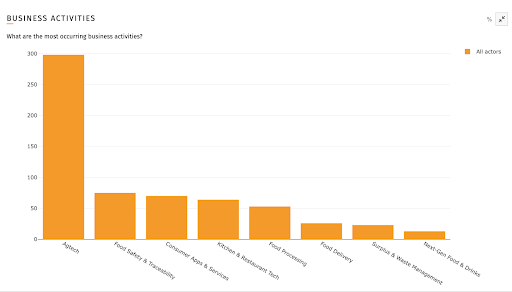
AgriFoodTech companies using AI & ML – Split by Activities (Source: FoodTech Data Navigator)
Below is a (non-exhaustive) list of impactful companies leveraging AI & ML:
Agtech
- CropX (FoodTech 500 alumni) – Leverages AI and ML to integrate farm data, real-time conditions, and agronomic knowledge, delivering guidance for sustainable farming. CropX teamed up with Syngenta to improve the sustainability and yield strength of Syngenta’s seed suppliers in the American Midwest. They also introduced a water management tool together with Rienke to provide affordable Actual Evapotranspiration (ETa) measurements with a sensor.
- Bonsai Robotics – Specializes in providing vision-based automation solutions, including AI-powered machine navigation and operations for off-road vehicles, specifically targeting agricultural machines, as they address the labor crisis in the industry. Bonsai Robotics secured $13.5M in seed funding last year, which it will use to accelerate its product roadmap and invest in hiring, sales, and marketing.
- Umitron – Aims to promote sustainable aquaculture by utilizing IoT, satellite remote sensing, and ML and address the issue of the rising cost of feeding by optimizing feed amount and timing using fish behavior analytics and water quality data. In 2022, Umitron raised around 15 million SGD in their pre-series B round from ENEOS Holdings, QB II Investment Limited Partnership, Toyo Seikan Group, and other commercial banks.
- Orchard Robotics, – Specializes in custom robotics. It utilizes advanced camera systems and computer vision software to track crop growth and yield for optimal farmer care. Earlier this year, Orchard Robotics raised $3.2M in seed funding, led by General Catalyst.
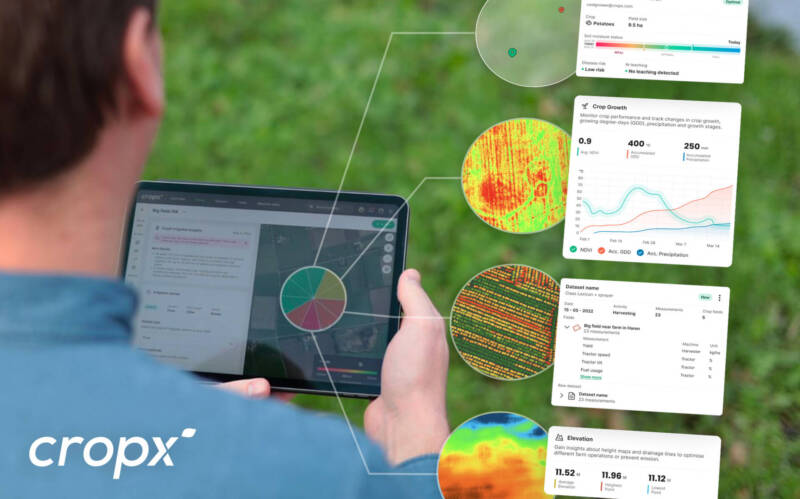
Image courtesy of CropX
Food Safety & Traceability
- Neolithics – Automates and upgrades quality control for fresh produce using their Crystal.eye™ technology. Their remote sensing solution allows distributors to quickly and accurately assess the quality of their produce, optimizing its utilization and ensuring that fresh and high-quality produce reaches consumers. Earlier this year, it launched Neolithics LightTM, a portable, automated produce inspection system.
- Afresh – Utilizes AI and ML to forecast future demand and provide replenishment recommendations for fresh produce, helping clients minimize waste, maximize freshness, and optimize profitability. Afresh has already prevented 44 million pounds of food waste and is continuously working towards a bigger impact.
- Yoran Imaging specializes in packaging process control. They have developed a non-intrusive in-line inspection system called Packaging Analytical Monitoring (PAM), which uses thermal imaging technology and advanced real-time algorithms to identify flaws and contaminants in heat-sealed packages and enhance continuous improvement.
Consumer Apps & Services
- SnapCalorie – Nutrition tracking app that allows users to take a photo of any meal and instantly access a detailed nutritional analysis. In 2023, SnapCalorie raised $2M in funding from investors, including Accel, Index Ventures, former CrossFit CEO Eric Roza, and Y Combinator.
- AiFi – Utilizes computer vision technology, eliminating the need for shelf sensors, and provides advanced tracking algorithms that can support various shopper journeys. AiFi has the highest number of computer vision-powered autonomous stores worldwide, as it partners with top retailers, including ALDI South Group, Carrefour, Compass Group, Morrisons, Żabka Group, REWE, and Verizon. Last April, AiFi launched a frictionless stadium market at Atlanta’s Mercedes-Benz Stadium in partnership with GS Draft.
- Ai Palette – Delivers AI-driven product development solutions to businesses operating in the food and consumer packaged goods sectors. It creates product concepts that align with a brand’s personality and existing product portfolio by garnering insights from millions of digital conversations and coupling them with company data to create concepts that address consumers’ unmet needs. In March, Ai Palette nabbed $5.7M in a series A1 funding led by Tin Men Capital.
Kitchen & Restaurant Tech
- Beyond Honeycomb – Develops an AI-driven kitchen solution. Its AI Chef reproduces the texture and taste of world-class chefs’ dishes at the molecular level. Their flagship product, GRILL X, is an AI robot that grills meat faster and more deliciously than human employees. In February, Beyond Honeycomb signed an MOU with premium pork belly brand ‘Hanam Pig’ to collaborate on researching, developing, and commercializing the AI chef solution, as well as exploring opportunities to expand globally.
- Bear Robotics – Addresses the increased pressure faced by the restaurant industry around wages, labor supply, and cost efficiencies. It makes robots that help customers receive an improved dining experience, employees with greater job satisfaction, and owners of restaurants with an increase in profits. It recently completed a $60M Series C funding round led exclusively by LG Electronics, which Bear Robotics will use to target emerging markets such as smart warehousing and supply chain automation.
- SATIS.AI – Develops a full-stack operating system for autonomous restaurant kitchens with an aim to improve labor and processes and reduce order mistakes. It delivers 25% higher speed of service, reduces mistakes in order by 40%, reduces the onboarding time by 20%, and reduces labor idle time on peak hours by 10%.
- Delicious Data – Specializes in using AI and ML to provide precise sales forecasts for catering businesses in the food service and catering industry. Their demand forecast engine helps kitchen chefs optimize purchase and production planning, saving resources and reducing costs. By combining historical data with external factors, their ML solution helps businesses reduce food waste and increase customer satisfaction.
Food Delivery
- Loop – A leading SaaS provider enabling restaurants to maximize their third-party delivery service profitability. Its platform provides financial reconciliation and bookkeeping automation, as well as real-time store availability management and performance metrics optimization. Earlier this year, Loop closed $6M in Seed funding, led by Base10 Partners, to expand its suite of products and serve restaurants’ complex back office needs.
- Feng eFood – An unmanned retail operator under Fengyi Technology, a smart vending machine company. Fengyi Technology focuses on the office field and uses AI smart cabinets as a carrier to provide urban white-collar workers with a wealth of breakfast, afternoon tea, snacks, beverages, and other commodity sales services.
- Freshflow – Helps grocery retailers manage fresh products through accurate order forecasting, replenishment, and inventory control, massively reducing food waste while still keeping shelves full.
- Refraction AI – Specializes in building and deploying robotic platforms for last-mile goods delivery in urban areas. Their robots are completely autonomous and equipped with a system of cameras, radar, and ultrasonic sensors. They can also be teleoperated and monitored remotely.
- Nuro – Specializes in developing autonomous delivery vehicles to transform local commerce, helping merchants deliver goods to customers. Nuro recently announced its collaboration with Arm Holdings to commercialize autonomous vehicles with AI built into their foundations.
- Ottonomy – A tech startup specializing in building autonomous robot fleets for contactless deliveries. The company’s mapping and perception technology allows its robots to navigate in both indoor and outdoor environments, providing businesses with a quicker, safer, and more economical delivery option compared to traditional third-party services. Ottonomy recently partnered with Harbor Lockers and Cooler Keg and introduced Ottobot Locker and Ottobot Brew at CES 2024.
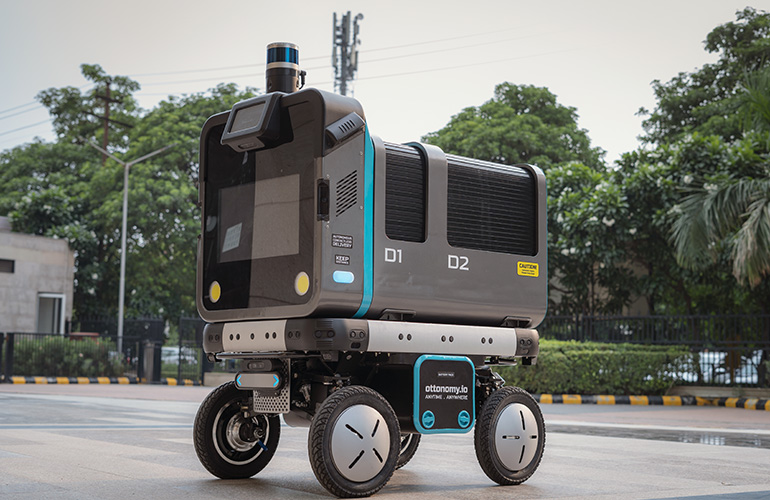
Image courtesy of Ottonomy
Surplus and Waste Management
- Wasteless – Offers ML and real-time tracking solutions to help grocery stores reduce food waste and increase profitability. Wasteless provides an all-in-one solution that allows supermarkets to offer customers dynamic pricing based on product expiration dates and perishability.
- SORTED – An AI-powered company specializing in providing innovative solutions for waste management companies. SORTED’s business and productivity software helps enhance recycling operations and promote sustainable practices, thereby addressing the global challenge of single-use plastics. In April, the company secured £1.65M which it will use to expand its business development and technical teams and accelerate its go-to-market strategy.
- Winnow – Builds AI tools to help chefs run more profitable and sustainable kitchens by cutting food waste in half. Their digital tools provide data to drive improvements in kitchen production processes and reduce environmental footprint. Winnow’s mission is to connect commercial kitchens, create a movement of chefs, and inspire others. Recently, the company expanded its partnership with the Mandarin Oriental Hotel Group, which will install the AI-driven food waste technology across its 40 hotels worldwide by the end of 2025.
- MOA FoodTech – Focuses on establishing a new sustainable food industry that does not rely on arable land. Its approach involves using biotechnology and AI to transform by-products of the AgriFoodTech industry into a next-generation protein that is highly nutritious and 100% sustainable. With the goal of designing high-value, natural, and nutritious food, MOA FoodTech is working towards solving the challenges posed by the unsustainable food industry, which will need to feed 9.8 billion people by 2050. The company has successfully closed a Series A funding round recently, spearheaded by ICOS Capital.
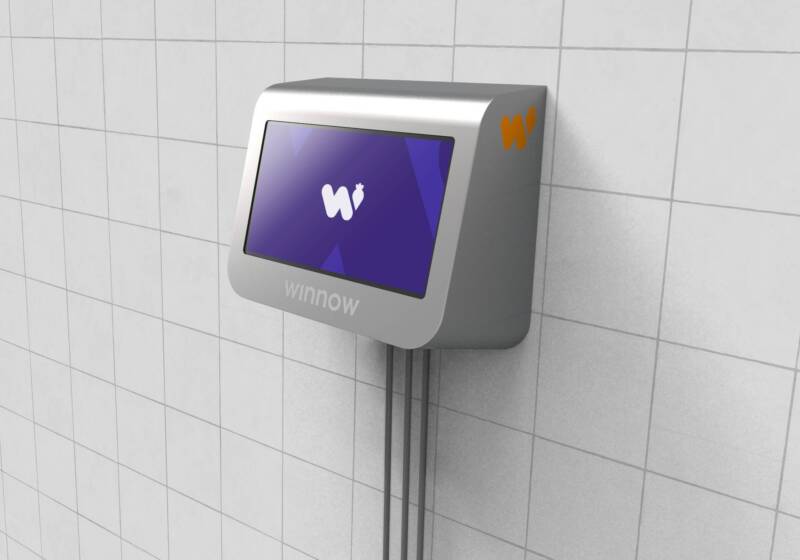
Image courtesy of Winnow
Next-Gen Food & Drinks
- NotCo – A Chilean FoodTech startup that leverages AI to create plant-based alternatives to animal products. Central to NotCo’s success is its AI platform, Giuseppe, whose algorithm analyzes the molecular structure of plant ingredients to identify combinations that replicate the taste and texture of animal products. Through its joint venture with The Kraft Heinz Not Co., TheNotCompany, Inc., NotCo collaborated with Oscar Mayer to launch NotHotDogs and NotSausages, marking the brand’s first plant-based product.
- New Wave Biotech – Uses AI and computational modeling to help precision fermentation alt protein companies optimize their downstream processing to de-risk their ventures, speed up R&D, and reduce costs. Its recent partnership with Multus showcases New Wave Biotech’s technology in helping transition to a sustainable global food system. An initiative by the UK Research and Innovation also acknowledges the company’s solutions as it selected New Wave Biotech to be part of its £13.5M Engineering Biology R&D fund.
- GreenProtein AI – Uses ML to consolidate the knowledge of alternative protein innovators to help companies find the perfect ‘extrusion’ settings for meat-like plant-based protein. This project, born out of a collaboration between sustainability non-profit Food System Innovations and AI and ML expert Noa Weiss, aims to enhance the quality and sustainability of alternative meat, as well as bring it closer to price parity with conventional meat.
- Nutri Co – A Peruvian FoodTech company that uses data science and algorithms to accelerate R&D in the food industry, with an aim of creating and democratizing the most nutritious, sustainable, and affordable plant-based products. Last year, Nutri Co raised $1M from funds and investors in Latin America to continue expanding its business and strengthen its entry into Mexico.
Food Processing
- Brightseed – A pioneering company that combines biosciences and AI to uncover the potential of bioactives in nature for restoring human health. Its AI platform, Forager®, accelerates the discovery and validation of bioactives, reducing the time it takes from years to months. By mapping bioactives to human health outcomes, Brightseed provides novel insights and science-backed health solutions to companies in the consumer health industry. In February, it launched Manitoba Harvest Bioactive Fiber in partnership with Manitoba Harvest, a global leader in hemp foods. The product is said to be the only fiber solution containing two powerful hemp-based bioactives, which promotes a healthy gut, supports healthy digestion and bowel regularity, helps reduce bloating and gas and supports weight management.
- Osmo – Gives computers a sense of smell by combining AI and olfactory science to improve the health and well-being of human life. Osmo has so far achieved breakthroughs in predicting the smell of molecules based on their structure, creating new molecules with never-before-experienced scents, and designing mosquito repellents that are more effective than DEET in human trials. Last month, the company opened its first scent salon, which drew experts from across the digital olfaction ecosystem—fragrance, culinary, art, fashion, media, and finance. The highlight was a unique scent made entirely of Osmo’s AI-generated molecules.
- Shiru – Leverages computational design and an AI-enabled discovery platform called Flourish to create game-changing ingredients for plant-based foods using precision fermentation. With a team of biochemists, data scientists, and business development professionals, Shiru is rapidly expanding and aims to impact a billion lives by changing the traditional food system with alternative functional food ingredients. The startup launched last month the “world’s first” protein discovery platform, which allows companies to find and procure sustainable proteins for product development.
- BioRaptor – Provides a single repository, strong analytics, and advanced AI/ML models to assist R&D professionals in various fields such as alternative proteins, gene and cell therapy. BioRaptor strives to make it easier, quicker, and more cost-effective for scientists to discover, develop, and scale processes in order to bring much-needed food and pharmaceutical products to those who need them. One company that recently tapped BioRaptor for its innovative solution is Aleph Farms, which will use the AI-led platform optimise the production of its cultivated beef.
- Cradle – Uses robust prediction algorithms and AI design recommendations to assist biologists in rapidly designing improved variants of target protein sequences. Cradle’s tools and ML models allow users to visualize, analyze, and predict the potential of protein candidates all in one place. The company’s mission is to help replace traditional farms and factories with more sustainable cell-factories. Last year, Cradle raised $24M, in a round led by Index Ventures, which it will use to expand its team and sales.
- Robovision – It has developed a collaborative platform called Robovision AI that enables domain experts without AI expertise to use computer vision algorithms and toolkits to train AI models and deploy computer vision applications at production sites. Their platform can be used in various industries such as agriculture, manufacturing, and healthcare to automate processes, improve quality control, and revolutionize traditional analytics and decision-making techniques in the healthcare sector. In March, Robovision secured $42M in Series A funding, which it will use to invest in R&D, and expand its business reach in existing markets, as well as scale in the US. Meanwhile, QING Forward Engineering also utilizes Robovision’s AI platform to create and maintain AI-models in food production.
AI and ML are at the forefront of the FoodTech revolution, offering solutions that enhance efficiency, safety, and personalization. From precision agriculture to personalised nutrition, these technologies are transforming how we produce, distribute, and consume food. As AI continues to evolve, the FoodTech industry is poised for even greater advancements, promising a future where technology and innovation ensure a safer, more efficient, and personalised food experience.
Don’t miss out! Be an Early Applicant for a chance to be a part of the 2024 FoodTech 500. Apply by July 31st, 2024, and fast-track your application to be reviewed sooner, giving you a head start in the assessment to join the ranks of the most innovative food tech startups. Know an innovative AgriFoodTech company that’s making waves? Nominate them for the next edition of the FoodTech 500. Read about all about what’s new in the 2024 FoodTech 500 and how startups, scale-ups, and ecosystem players can benefit from it.
Forward Fooding is the world’s first collaborative platform for the Food & Beverage industry via FoodTech Data Intelligence and Corporate-Startup Collaboration – Learn more about our Consultancy and Scouting Services and our Startup Network.
Follow us
Sponsored Articles
9 July 2025
Forward Fooding celebrates the selection of 12 pioneering startups for the inaugural pladis Accelerator Programme. From water lily popcorn to sugar-converting enzymes, these innovations represent the future of snacking, addressing obesity, sustainability, and personalized nutrition through cutting-edge food technology.
21 March 2025
Tim Ingmire, VP of Global Innovation & Technology at pladis, discusses how the snacking giant is supporting early-stage startups in foodtech, health, and sustainability through their accelerator program. Learn about their focus on personalized nutrition, functional foods, and future ingredients to bring innovative, delicious products to consumers worldwide.
8 February 2024
Future Food-Tech returns to San Francisco on March 21-22 Over 1,700 food-tech leaders, from CPG brands, retailers, ingredient providers, [...]
1 February 2023
The 4th edition of FoodTech 500 is taking off and we are excited to partner with NEOM for the third consecutive year to support the best international AgriFoodTech entrepreneurs.
10 February 2022
One of the elements we enjoy the most here at Forward Fooding about working with AgriFoodTech startups is being [...]
